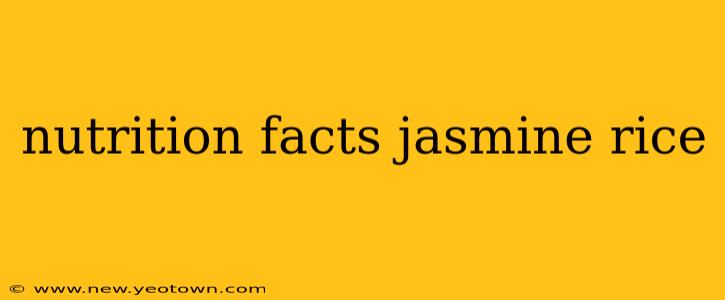Jasmine rice, with its fragrant aroma and fluffy texture, is a staple in many cuisines worldwide. But beyond its delicious appeal lies a nutritional profile worth exploring. This isn't just about calories; it's about understanding how this grain fits into a balanced diet. Let's embark on a journey to uncover the complete nutritional facts of jasmine rice and answer some frequently asked questions.
What are the nutritional benefits of jasmine rice?
Jasmine rice, like other types of rice, offers a decent source of carbohydrates, providing the body with energy. However, it's not just empty carbs. While it's lower in fiber compared to brown rice, it still contributes to your daily intake, aiding digestion. It also contains small amounts of essential minerals like manganese, magnesium, and selenium, vital for various bodily functions. Think of it as a gentle energy boost and a subtle contribution to your micronutrient needs. The story, however, is more nuanced than a simple carbohydrate source.
Is jasmine rice good for weight loss?
This is a common question, and the answer isn't a simple yes or no. Jasmine rice, being relatively high in carbohydrates, can contribute to weight gain if consumed in excess, especially when paired with high-fat foods. However, incorporating it into a balanced, calorie-controlled diet alongside lean protein and plenty of vegetables can be part of a healthy weight management plan. The key is moderation and mindful portion control. Remember, the overall dietary pattern is more significant than focusing solely on one ingredient.
How many calories are in a cup of cooked jasmine rice?
A typical cup (approximately 195 grams) of cooked jasmine rice contains around 200-210 calories. It's important to note that slight variations may occur depending on the cooking method and brand. Always check the specific nutritional information on the packaging of the rice you're using for the most accurate calorie count. This information helps in mindful portioning and calorie tracking, especially for those watching their weight.
Is jasmine rice gluten-free?
Yes, jasmine rice is naturally gluten-free, making it a safe and suitable choice for individuals with celiac disease or gluten intolerance. However, always check the packaging to ensure that there's no cross-contamination during processing, particularly if you're purchasing pre-packaged mixes or convenience products. This is crucial for anyone with severe allergies.
How does jasmine rice compare to brown rice nutritionally?
While both are good sources of carbohydrates, brown rice boasts significantly higher levels of fiber and nutrients like magnesium and selenium. Brown rice retains its bran layer, which is where much of the nutritional value lies. Jasmine rice, on the other hand, is milled to remove the bran layer, resulting in a softer texture but a slightly lower nutritional density. The choice often comes down to personal preference and dietary priorities. If you prioritize fiber and maximum nutritional value, brown rice might be a better option.
What are the potential downsides of eating too much jasmine rice?
Consuming excessive amounts of jasmine rice, especially without balancing it with other food groups, can lead to several issues. The high carbohydrate content can contribute to blood sugar spikes, weight gain, and potential digestive discomfort for some individuals. A balanced diet rich in fruits, vegetables, and lean protein is key to mitigating these potential negative effects.
Conclusion: Jasmine Rice in a Balanced Diet
Jasmine rice, with its delightful flavor and texture, can certainly have a place in a healthy diet. However, understanding its nutritional profile and consuming it in moderation, as part of a balanced eating plan, is crucial. Remember to consider your overall dietary habits and consult with a registered dietitian or nutritionist if you have specific dietary concerns or needs. By making informed choices, you can enjoy the deliciousness of jasmine rice while supporting your overall well-being.

